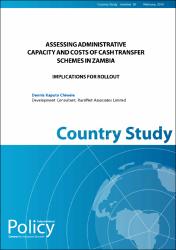Please use this identifier to cite or link to this item:
https://repositorio.ipea.gov.br/handle/11058/15150Files in This Item:
| File | Description | Size | Format | |
|---|---|---|---|---|
| en_IPCCountryStudy20.pdf | 751.36 kB | Adobe PDF |  View/Open |
| Title: | Assessing Administrative Capacity and Costs of Cash Transfer Schemes in Zambia – Implications for Rollout |
| Authors: | Chiwele, Dennis Kaputo |
| Abstract: | The Ministry of Community Development and Social Services (MCDSS) has taken the decision to rollout in 2009 a national social cash transfer scheme (SCTS) to cover the whole country by 2012. Thus far, social cash transfer schemes are being piloted in five districts in Southern and Eastern Provinces. The schemes are using structures created for the implementation of the Public Welfare Assistance System (PWAS) which rise from community level all the way to the national level. The adoption of pilot SCTS in Zambia follows the growing acceptance of social cash transfers as a means for assisting extremely poor households. Partly, this is due to the positive impact of conditional cash transfers in Latin America with respect to school enrolments, improved health and reduction in poverty levels for participating households. An evaluation of the Kalomo SCTS revealed a number of achievements with respect to impact on the beneficiaries including a rise in self-esteem and confidence among beneficiaries, reduced incidence of begging, increased food consumption, increased asset ownership and positive impacts for the local economy. Field work for this assessment although not focused on assessing impacts noted qualitative evidence of these findings. Implementation of pilot schemes started in 2004 with the Kalomo SCTS followed by one in 2005 in Kazungula, 2006 in Chipata and in 2007 in Monze and Katete. The schemes have been implemented with some variation so that they “generate information on the feasibility, costs and benefits and negative impacts of a Social Cash Transfer Scheme…” (Zulu and Schuring, May 2007, p.1). Each of the pilot scheme has been designed to form a part of the learning agenda that would utilise lessons towards the design of a national social cash transfer. It is also being assessed as to the extent to which the PWAS structures are able to accommodate social cash transfer along existing social welfare activities. |
| metadata.dc.rights.holder: | International Policy Centre for Inclusive Growth United Nations Development Programme |
| metadata.dc.rights.license: | O texto e dados desta publicação podem ser reproduzidos desde que as fontes sejam citadas. Reproduções com fins comerciais são proibidas. |
| metadata.dc.type: | Research Report |
| Appears in Collections: | Publicações do IPC-IG |
Items in DSpace are protected by copyright, with all rights reserved, unless otherwise indicated.

